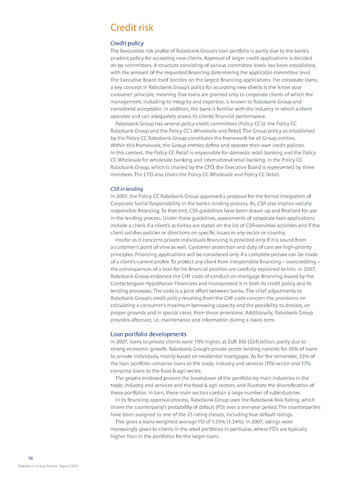Credit risk
Credit policy
Loan portfolio developments
The favourable risk profile of Rabobank Group's loan portfolio is partly due to the bank's
prudent policy for accepting new clients. Approval of larger credit applications is decided
on by committees. A structure consisting of various committee levels has been established,
with the amount of the requested financing determining the applicable committee level.
The Executive Board itself decides on the largest financing applications. For corporate loans,
a key concept in Rabobank Group's policy for accepting new clients is the 'know your
customer' principle, meaning that loans are granted only to corporate clients of which the
management, including its integrity and expertise, is known to Rabobank Group and
considered acceptable. In addition, the bank is familiar with the industry in which a client
operates and can adequately assess its clients' financial performance.
Rabobank Group has several policy credit committees (Policy CC's): the Policy CC
Rabobank Group and the Policy CC's Wholesale and Retail. The Group policy as established
by the Policy CC Rabobank Group constitutes the framework for all Group entities.
Within this framework, the Group entities define and operate their own credit policies.
In this context, the Policy CC Retail is responsible for domestic retail banking and the Policy
CC Wholesale for wholesale banking and international retail banking. In the Policy CC
Rabobank Group, which is chaired by the CFO, the Executive Board is represented by three
members. The CFO also chairs the Policy CC Wholesale and Policy CC Retail.
CSR in lending
In 2007, the Policy CC Rabobank Group approved a proposal for the formal integration of
Corporate Social Responsibility in the bank's lending process. As, CSR also implies socially
responsible financing. To that end, CSR guidelines have been drawn up and finalised for use
in the lending process. Under these guidelines, assessments of corporate loan applications
include a check if a client's activities are stated on the list of CSR-sensitive activities and if the
client satisfies policies or directions on specific issues in any sector or country.
Insofar as it concerns private individuals financing is provided only if it is sound from
a customer's point of view as well. Customer protection and duty of care are high-priority
principles. Financing applications will be considered only if a complete picture can be made
of a client's current profile. To protect any client from irresponsible financing - overcrediting -
the consequences of a loan for his financial position are carefully explained to him. In 2007,
Rabobank Group endorsed the CHF code of conduct on mortgage financing issued by the
Contactorgaan Hypothecair Financiers and incorporated it in both its credit policy and its
lending processes. The code is a joint effort between banks. The chief adjustments to
Rabobank Group's credit policy resulting from the CHF code concern the provisions on
calculating a consumer's maximum borrowing capacity and the possibility to deviate, on
proper grounds and in special cases, from those provisions. Additionally, Rabobank Group
provides aftercare, i.e. maintenance and information during a loan's term.
In 2007, loans to private clients were 10% higher, at EUR 356 (324) billion, partly due to
strong economic growth. Rabobank Group's private sector lending consists for 50% of loans
to private individuals, mainly based on residential mortgages. As for the remainder, 33% of
the loan portfolio comprise loans to the trade, industry and services (TIS) sector and 17%
comprise loans to the food agri sector.
The graphs enclosed present the breakdown of the portfolio by main industries in the
trade, industry and services and the food agri sectors, and illustrate the diversification of
these portfolios. In turn, these main sectors contain a large number of subindustries.
In its financing approval process, Rabobank Group uses the Rabobank Risk Rating, which
shows the counterparty's probability of default (PD) over a one-year period. The counterparties
have been assigned to one of the 25 rating classes, including four default ratings.
This gives a loans-weighted average PD of 1.55% (1.34%). In 2007, ratings were
increasingly given to clients in the retail portfolios in particular, where PD's are typically
higher than in the portfolios for the larger loans.
76
Rabobank Group Annual Report 2007

